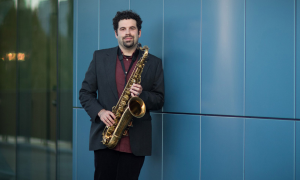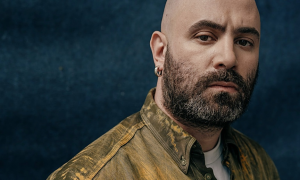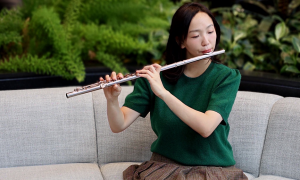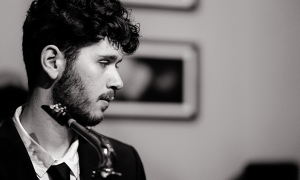Home » Jazz Articles » Take Five With... » Take Five with Bartosz Hadala
Take Five with Bartosz Hadala
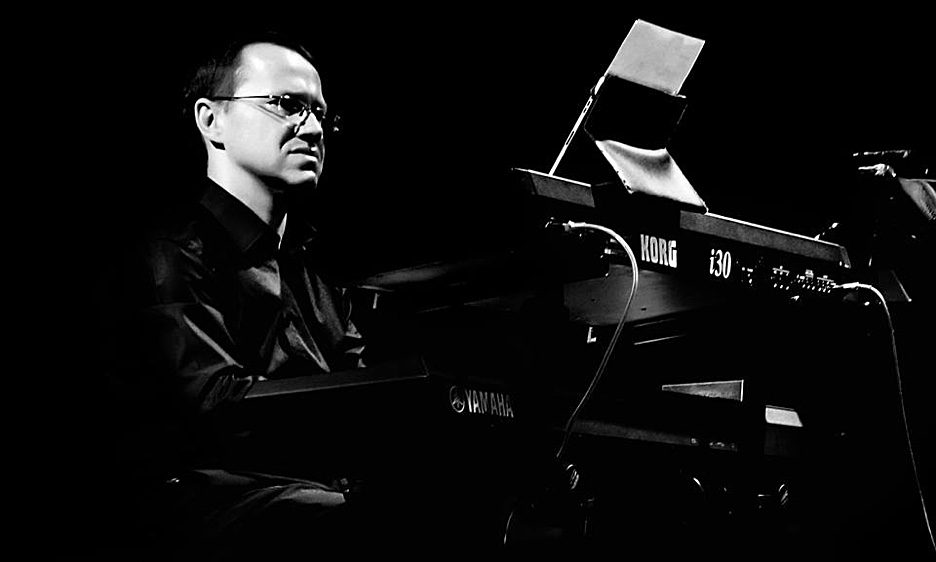
Meet Bartosz Hadala
Bartosz Hadala was born in Stalowa Wola, Poland and started his musical education at the age 7 at the local School of Music. Still as a teenager he participated in competitions, workshops and festivals. He became the youngest finalist in the Mieczyslaw Kosz International Jazz Piano Competition at the age 15. Two years later he was awarded a scholarship to Berklee College of Music in Boston, MA. In 1996, he left for Odessa, Ukraine, to study at the Odessa Conservatory with professor Anatoliy Kardashev. In 1998, Bartosz went to the USA to study jazz at Western Michigan University in Kalamazoo, MI. In 2003 he presented his quintet at the IAJE Conference in Toronto, Canada. In May, the same year, he moved to New York City to pursue his career in music. He worked and recorded music with many well known artists, such as: Randy Brecker, Billy Hart, Lenny White, Antonio Sanchez, Johannes Weidenmueller, Dave Anderson, Ada Rovatti, andJon Irabagon.In 2010 Bartosz moved to Toronto (Canada). In the last 10 years he had a pleasure of performing and recording with Canada's greatest jazz musicians: Chris Gale, Luis Deniz, Kelly Jefferson, Eric St-Laurent, Mike Downes, Rich Brown, Brad Cheeseman, Mark Kelso, Larnell Lewis, Nick Fraser, Marito Marques, and many others.
Also in 2010, Bartosz joined the Piloo Records and Production label to release his first jazz album entitled The Runner Up, featuring jazz greats, trumpeter Randy Brecker, and drummer Antonio Sanchez. The album has been well received by the critics, who praised Bartosz for his musicianship and his compositions.
In the last 10 years, Bartosz visited Poland on many different occasions where he performed as a leader and sideman with many legendary Polish musicians: Jacek Pelc, Jarek Śmietana, Piotr Olszewski, Henryk Miśkiewicz, Maciej Sikała as well as Grammy Winners bassist Paweł Pańta and drummer Cezary Konrad.
Instruments:
Piano and everything else with keys.Teachers and/or influences?
I'm a classically trained pianist and there were quite a few teachers in my life. Even though my heart was always in jazz I managed to learn the classical etiquette and have had a decent amount of engagements as an accompanist. I have to thank professor Carl Ratner from Western Michigan University, who really boosted my confidence in that area. Anatoliy Kardashev was my professor in Odessa (Ukraine). He made me learn so many classical pieces that I could barely breath, and it definitely paid off in every aspect of my career.My jazz education started at a jazz camp in Poland. Wojciech Niedziela was my first jazz piano teacher and I learned a lot from him. My next jazz teacher was Stephen Zegree from WMU, very well known in the world of vocal jazz for his arrangements and running Gold Company vocal jazz group. He gave me a lot of freedom and let me crash & burn and that was the best learning method for me.
My biggest mentor is Fred Hersch. I have had a privilege of taking a few lessons with him. I know many of his recordings, I studied his compositions, I'm learning his transcriptions, and I admire everything about him. It is funny, because we don't have too much in common when it comes to music we produce, but every time I need inspiration I listen to his music.
I knew I wanted to be a musician when...
When I heard Dixieland music at my house. My father's vinyl collection included recordings of Louis Armstrong, Charlie Parker, Jimmy Smith, and many others.Your sound and approach to music.
I let others judge my sound. I believe some people can tell how much I love Chick Corea. His trio recording Alive with John Patitucci & Dave Weckl was something I listened to for years. I also enjoyed many other recordings of his including Electric Band #2. I saw that group when I was 17, in Warsaw (Poland), and I was completely blown away.My approach to music? 100 percent intuitive. I go with what I know and go with the sounds I love. I'm happy I play piano, because it is like having the entire orchestra at my fingers. When I compose music I write all the parts when necessary. Some bass players like it, some think I made a mistake by writing their part out :)
Your teaching approach
I used to teach, I don't anymore. I am so much into playing what I hear that I have a hard time agreeing with classical teachers directing every finger motion and every gesture and turning their students into puppets. I believe music should be studied by listening to your favourite recordings and trying to imitate them, just like we do in jazz.Your dream band
I'm very happy to say that my current band is great (Luis Deniz, Eric St-Laurent, Brad Cheeseman, and Marito Marques). These guys are full time pros and they seem to like my music.When I was younger I dreamt about recording with legends, but later on I realized that all I really need are pro players around my age, who are my friends and are interested in my music.
Road story: Your best or worst experience
I was doing a short tour in Poland with a very famous US musician. Even though the gig was under my name the concert promoter decided to advertise the show with the name of our special guest. When we realized what was going on our American friend demanded a lot more money for his appearance and he almost got what he wanted. It was a very valuable lesson in how to deal with dishonest promoters.Favorite venue
I have to say I really liked Carnegie Hall, great piano & decent acoustics :)Your favorite recording in your discography and why?
I like all of my recordings for different reasons. My jazz debut album The Runner Up featured Randy Brecker and Antonio Sanchez, as well as Ada Rovatti, Noriko Ueda, Dave Anderson and Kevin Garcia. It was a dream come true, still can't believe it actually happened, and I'm sure it will be hard to top that experience.The most recent recording Three Short Stories was all about friendship and great vibes, and I'm glad the music is so much different from my previous recordings. I hope it is a step in the right direction.
What do you think is the most important thing you are contributing musically?
I hope my compositions are not all garbage :) I take my time to make sure I present my musical ideas precisely, and I also pay great attention to my arrangements.Did you know...
I have 3 kids and the tune Three Short Stories is dedicated to them. The first jazz album I bought was:
I think it was Keith Jarrett's The Köln Concert. The music wasn't anything I expected, but it grew on me very quickly. I also remember buying a bunch of cassette tapes at the age 15 with music by Miles Davis, John Coltrane and Bill Evans.Music you are listening to now:
I like going on YouTube and checking out recordings by Hiromi, Fred Hersch, Chick Corea, Herbie Hancock, and many many others.Desert Island picks:
Fred Hersch: Songs Without Words (Nonesuch)Keith Jarrett: The Köln Concert (ECM)
Chick Corea Acoustic Band: Alive (GRP)
How would you describe the state of jazz today?
The audience seems to be shrinking and we see less and less jazz being booked at jazz festivals. I guess we have to stay positive and keep building our own audience.What are some of the essential requirements to keep jazz alive and growing?
While Wynton Marsalis is taking care of the musical history of jazz by himself, all we have to do is stay focused on the future and listen to what's going on around us. We have to be like Miles or Herbie, or Wayne :-)What is in the near future?
Normally I would be a little intimidated by such question, because I keep thinking I'm not busy enough (which isn't really true). But now, during the Covid-19 times, I'm going to say that only God knows what the future holds. Right now I'm posting short recordings of my arrangements of music by F. Chopin on my Facebook Page.What is your greatest fear when you perform?
I worry that I'm going to talk too much to the audience instead of playing :-)What song would you like played at your funeral?
By the way, I am a church organist. I wouldn't mind a piece by J. S. Bach.What is your favorite song to whistle or sing in the shower?
No favourites here. If I'm humming anything it might be one of the children's songs that my kids play around the apartment. I often take my phone with me and listen to jazz, how cool is that?By Day:
I babysit, cook and plan my evening.If I weren't a jazz musician, I would be a:
A basketball player. Let me tell you about Michael Jordan.If I could have dinner with anyone from history, who would it be and why?
Pianist Arthur Rubinstein. He lived his life to the fullest and left lots of great music for us. It would be amazing to hear him play in private and chat with him about life, listen to anecdotes and stories.Is it still possible to make a living playing music?:
It is challenging, but not impossible. And I'm talking about life outside of teaching. I have a steady gig as an organist, but sometimes I laugh at the variety of gigs I do outside of church, including pop, jazz, cabaret and classical gigs. I also compose/arrange music in Finale and use Cubase when I need to record something. I want to say that being a jazz musician is the best thing ever. The amount of knowledge/skills we need to acquire to be able to improvise make us highly adaptable and unique.Tags
Take Five With...
Bartosz Hadala
Michael Ricci
Boston
Toronto
New York City
randy brecker
Billy Hart
Lenny White
Antonio Sanchez
Dave Anderson
Ada Rovatti
Jon Irabagon
Eric St-Laurent
Mike Downes
Brad Cheeseman
Mark Kelso
Larnell Lewis
Nick Fraser
Marito Marques
Louis Armstrong
Charlie Parker
Jimmy Smith
Chick Corea
John Patitucci
Dave Weckl
Keith Jarrett
Miles Davis
John Coltrane
Bill Evans
Hiromi
Fred Hersch
Herbie Hancock
Johannes Weidenmueller
PREVIOUS / NEXT
Support All About Jazz
 All About Jazz has been a pillar of jazz since 1995, championing it as an art form and, more importantly, supporting the musicians who make it. Our enduring commitment has made "AAJ" one of the most culturally important websites of its kind, read by hundreds of thousands of fans, musicians and industry figures every month.
All About Jazz has been a pillar of jazz since 1995, championing it as an art form and, more importantly, supporting the musicians who make it. Our enduring commitment has made "AAJ" one of the most culturally important websites of its kind, read by hundreds of thousands of fans, musicians and industry figures every month.









